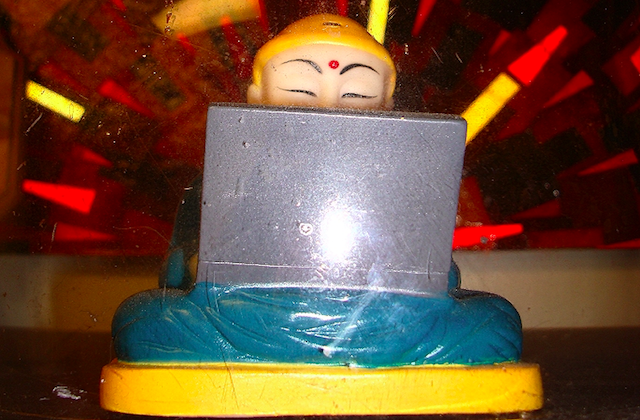
“Be present. It is the only thing that matters.” ~Peaceful Warrior
Technology pervades our world. From cell phones and laptops to iPods and digital cameras, the average person owns an arsenal of gadgets that, in many ways, simplify life.
You can increase your productivity, connect with people quickly, and access information instantaneously—while documenting your every move via tweets and photos to upload to Twitpic or Facebook.
Which begs the question: At what point does technology stop enhancing life and start detracting from it?
When you feel tied to your phone and enslaved by your email, can you pull away, center, and take a tech-vacay outside the shadow of your laptop?
Does it stress you out to disconnect in an always-on world where everything moves at the speed of light?
And lastly, do the people in your life suspend their sense of urgency long enough to allow you a break?
The technology itself is not to blame; just like guns don’t cause violence, gadgets don’t obliterate our mindfulness. We’re in control of the tools we use. Still, it isn’t easy to stay present and focused in a world that’s always plugged in—and to every available outlet.
The possibility of mindfulness underlies almost everything we publish at Tiny Buddha in an attempt to harness technology for personal growth and wisdom. With this in mind, I couldn’t be more delighted to learn about the Wisdom 2.0 Conference, which will take place this month in Mountain View, California.
Soren Gordhamer, who wrote a book also called Wisdom 2.0, has secured some amazing speakers, who each have their own unique perspectives on wisdom in the tech age. Twitter, Facebook, and Google will all have a presence, not to mention Yoga Journal, Whole Foods, and a number of wellness-focused organizations.
While meeting with Soren last week to discuss the event and my possible involvement, I thought of some ideas to stay present in a world dominated by gadgets. Here’s what I came up with:
1. Commit to single-tasking at least three daily activities.
It would be easy to say “stop multitasking” while I have seven tabs open in my browser, but that would be hypocritical and not entirely realistic. You’ll likely continue to multi-task certain things, just as I will, to handle your various responsibilities.
Instead of attempting a complete behavioral shift, I recommend making some small, sustainable changes to connect with the present throughout your day.
Choose a few tasks you will not multitask, like eating dinner or talking with your mother on the phone. Don’t watch TV. Don’t answers emails. Only do those things. It’s just fifteen to thirty minutes a few times a day, but it will make a big difference and maybe inspire you to do it more often.
2. Challenge yourself not to respond to texts and emails immediately when possible.
At work, you may not have the luxury of taking your sweet time responding. But more often than not, you don’t need to shoot someone a rapid-fire answer the second they send a question. You own your phone and laptop, not the other way around.
People often expect immediate attention, but remember that you control their expectations. If you increase your response time, people won’t find it unusual; eventually, they’ll come to realize that you answer your messages when it’s convenient for you and you’re ready—not sooner, unless it’s urgent.
3. Create pre-written text messages to decrease your tech-engagement time.
Most cell phones have a few pre-written messages you can send to save time, i.e.: be home later, I don’t know, etc. You usually have the option to customize your own. I recommend the following:
- With my family. Please email me and I’ll get back to you later.
- Done with work for the night. Please email me and I’ll handle at work in the AM.
- Taking a tech-free day. I’ll respond to all texts tomorrow.
4. Put your gadgets away when you’re not using them.
There’s no reason to turn your kitchen table into Best Buy, especially if you end up squeezing meals around it. When you’re not using your phone, camera, or iPod, put them away in a drawer. It will also help to create a charging station near your desk or behind your couch so you don’t end up with cords all over the place.
5. Minimize electronics in your bedroom.
You may be accustomed to lying in bed with your laptop and indulging the sleep-threatening habit of browsing late at night. Sleep experts recommend decreasing stimulation for an hour before going to bed so your mind unwinds, allowing a restful evening.
To create a space that makes you feel calm and focused, you may want to remove the TV and computer altogether. You need a space to retreat from the busyness of your day. It will feel a lot more peaceful if you keep that busyness out of your little oasis.
6. When browsing or working online, close tabs you don’t need.
It’s a simple little thing that may sound inconsequential, but I’ve noticed it has a profound effect on my state of mind. When I have fifteen open tabs, my attention feels scattered, no matter how hard I try to concentrate.
Mindfulness means focusing solely on the task in front of you, whether you’re washing dishes or writing an email. If you only keep what you need on the screen, it may be easier to absorb yourself in any one task.
7. Enlist a buddy for less tech distractions.
When you’re eating lunch and your best friends starts texting, even if you don’t take it personally you may feel less connected. Most likely you’ve done the same thing on occasion; I know I have. Recently, I’ve asked a couple friends if they can relate to feeling tech-absorbed.
The next logical question is: Do you want to try a tech-free afternoon with me? No texting, no tweeting, no Facebook updating, just lunch and a movie, and perhaps voicemails to answer later. Not everyone will jump onboard, but it’s worth it if even just one friend consents do a day without distractions.
8. Write hand-written letters.
There are certain things you may always email: lunch invitations, movie times, follow-up messages after interviews. But not everything needs immediate delivery. Writing with a pen on paper connects you with your feelings and grounds you in the present moment. What’s more, recipients usually appreciate the time and effort you put into writing them.
Let a friend know what you admire about her. Send your sister a letter telling her that you appreciate her being there. Little is more rewarding than letting yourself enjoy something without distractions and realizing it makes a difference to someone else.
I generally like to write lists with ten tips because it’s a nice, round number, but I’ve decided to minimize my time on my laptop this afternoon.
So I open this up to you: How do you stay present and focused in a world where tech is king?
Photo here.
About Lori Deschene
Lori Deschene is the founder of Tiny Buddha. She started the site after struggling with depression, bulimia, c-PTSD, and toxic shame so she could recycle her former pain into something useful and inspire others to do the same. You can find her books, including Tiny Buddha’s Gratitude Journal and Tiny Buddha’s Worry Journal, here and learn more about her eCourse, Recreate Your Life Story, if you’re ready to transform your life and become the person you want to be.
- Web |
- More Posts












 Though I run this site, it is not mine. It's ours. It's not about me. It's about us. Your stories and your wisdom are just as meaningful as mine.
Though I run this site, it is not mine. It's ours. It's not about me. It's about us. Your stories and your wisdom are just as meaningful as mine.
[…] Hey all, just wanted to share a great post I read over at TinyBuddha. I subscribe to their email RSS newsletter, and I always receive great quotes, insight and motivation from their writers. Today’s post is entitled 8 Ways to Stay Present & Focused in a Tech-Driven World. […]
[…] This post was mentioned on Twitter by Douglas Hill, Michael Landgrebe, Nick Treadway, Positively Present, Jessie Jessup and others. Jessie Jessup said: RT @tinybuddha: 8 Ways to Stay Present & Focused in a Technology-Driven World http://bit.ly/7R80LR […]
Social comments and analytics for this post…
This post was mentioned on Twitter by kris10ized: by Lori Deschene
Technology pervades our world. From cell phones and laptops to iPods and digital cameras, t… http://bit.ly/6U2B4G #quote…
[…] post offered 8 tips to stay focused and present in a technology-driven world. We neglected to mention the most important and helpful suggestion: breathe. It’s such a […]
[…] 8 Ways to Stay Present and Focused in a Tech-Driven World […]
[…] 8 Ways to Stay Present and Focused in a Tech-Driven World SHARETHIS.addEntry({ title: "When You’re Tied to Your Phone", url: "http://tinybuddha.com/blog/when-youre-tied-to-your-phone/" }); tweetmeme_style = 'compact'; tweetmeme_url = 'http://tinybuddha.com/blog/when-youre-tied-to-your-phone/'; tweetmeme_source = 'tinybuddha'; […]
[…] mentioned in 8 Ways to Stay Present & Focused in a Tech-Driven World). Choose one task to complete mindfully today, and maybe add to that tomorrow. My favorite is […]
[…] […]
[…] of us, myself included, become so immersed in everyone and everything with a sense of urgency and expediency; we become almost robotic “beings,” executing tasks just to complete […]
[…] notifications and only check your inbox in the morning and in the evening. It’s time for a mental detox. Between Twitter, Facebook, the news, and conversations with friends, there’s always a steady […]
[…] Turning off your cell phone, no matter who might call or text, because there’s something you’d like to do with all […]
[…] Pearlman (from Facebook) had some of the most practical suggestions for living peacefully in a technology-driven world. Her main advice was to make it fun instead of considering it another […]
[…] 8 Ways to Stay Present and Focused in a Tech-Driven World […]
[…] Assignment: Read Staying Focused in a Tech Driven World on Tiny […]
[…] (especially fiction) are published and how books are placed. The most important quality is to be consistent. LA […]
I too love technology and make it a point to as you say to “harness technology for personal growth and wisdom” only.
How do I do this? Balance.
In my opinion…everything in life must be balanced. I’ve found this not only makes the hardest tasks easier, but it helps maintain a fantastic level of inner peace.
Lori, thank you for the great reminder!
So true! I find it all comes down to balance. I’m glad you enjoyed this post. =)
[…] to look like. These varied life experiences allow us to express ourselves more fully and be more authentically present in the […]